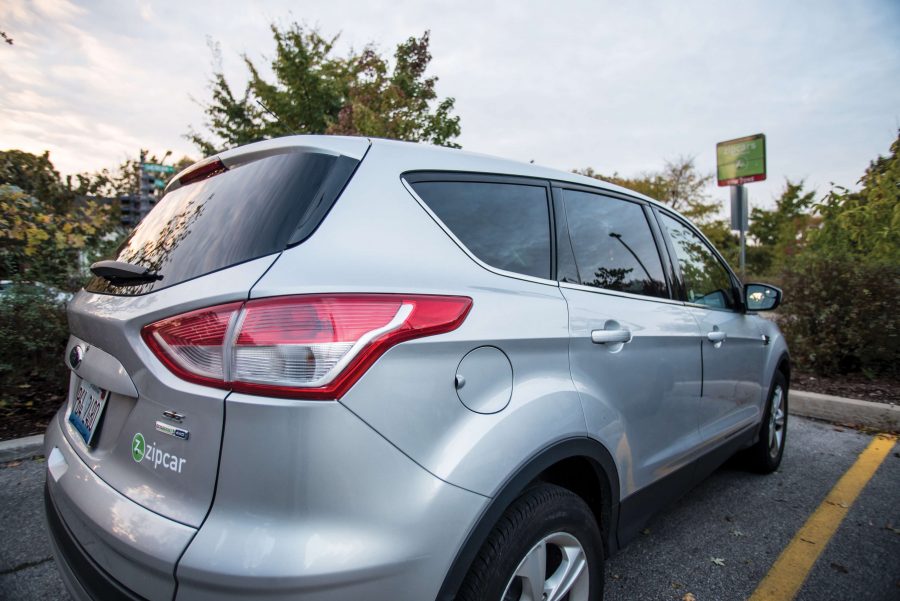Universities like Northwestern see reduced car ownership due to Zipcar, study shows
Colin Boyle/The Daily Northwestern
A Zipcar is parked on Northwestern’s campus. According to a recent study, the car sharing company has reduced the number of individually-owned vehicles on college campuses nationwide.
October 27, 2016
Zipcar, a car sharing company with 12 vehicles available on or near Northwestern’s campus, has reduced the number of individually-owned vehicles on college campuses nationwide, according to a recent study.
During the study led by Susan Shaheen, professor and co-director of the Transportation Sustainability Research Center at University of California, Berkeley, researchers partnered with Zipcar to survey 10,040 current university students, staff and faculty at more than 500 campuses affiliated with Zipcar in North America. The results showed a 5.3 percent reduction in personal car ownership among Zipcar users on Midwestern, suburban college campuses like NU.
“Carsharing shifts the fixed costs of auto ownership to variable costs on a per trip basis,” Shaheen told The Daily. “It allows some college (and) university market members to sell or avoid a personal vehicle purchase due to access to a shared vehicle fleet on an as-needed basis.”
Adam Stocker, research associate at the Transportation Sustainability Research Center, said the study explored two aspects contributing to a net change in car ownership: vehicles purchased by individuals and personal vehicles sold. Researchers found a decrease in vehicles purchased and an increase in personal vehicles sold, he said.
Stocker said 4.6 percent of survey recipients responded that they would have purchased a car in the absence of Zipcar, and only 0.6 percent said they would have sold their own cars.
“This makes sense because 90 percent of our respondents were students, and generally as a college student in the United States, your need for a vehicle is pretty low,” Stocker said. “Students aren’t necessarily going to sell that many vehicles if they don’t have many vehicles to sell in the first place.”
In decreasing personal car ownership, Zipcar aims create more room for other university purposes, said Lindsay Wester, public relations manager at Zipcar.
“Zipcar is definitely freeing up space on college campuses,” Wester said. “This is space that could be otherwise used for classroom buildings, science labs and even athletic fields.”
Wester said data from Shaheen’s study shows 30 percent of students surveyed would have brought a car if Zipcar were not available, substantially increasing campus congestion.
Weinberg junior Matthew Xu uses Zipcar to get groceries and go to restaurants in downtown Evanston.
“I actually did think about bringing my car to campus this quarter, but then there’s insurance, gas money and getting it here,” Xu said. “Since Zipcar is so convenient, I decided to stick with just Zipcar.”
Zipcar focuses on vehicle efficiency, both in the form of spatial conservation and reduction of costs, Wester said. A world where car share users outnumber car owners is the company’s ultimate goal, she said.
Jane Grover, former 7th Ward alderman, expressed her own concerns about space congestion in the city.
“I know we are pretty densely parked in parts of Evanston, including close to campus, so any way that you can avoid having to own a car at Northwestern University, I think would be a good thing,” Grover said. “Ride sharing allows you to do that.”
Email: [email protected]
Twitter: @gabbygrossman13


